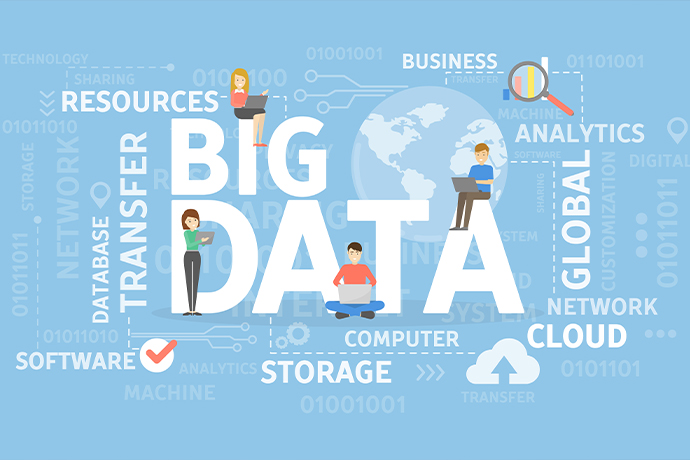 SPEAKERS
SPEAKERS
 TOPICS
TOPICS
Learn how big data is changing decision-making, operational efficiency, and innovation in data-centric operational landscapes!

Big data is used to drive strategy and make decisions in this fast-paced, technical world. Real-time analytics of exabytes of data can provide the most profound insights, reveal trends, and enable decision-making with unprecedented accuracy. These proficiencies could potentially enhance your company's operational efficacy, foster creativity, and improve customer satisfaction. Adopting big data will enable you to quickly adjust to shifting dynamics and maintain an advantage in the cutthroat industry.
Big data, in this context, is pretty transformational in terms of altering how business enterprises conduct activities and compete in this fast-paced, data-centric marketplace. By using big data, an organization will remain competitive and be able to adapt to market changes and new opportunities at ever-increasing speed. This piece will discuss with much elaboration the ways in which big data is changing decision-making and rewriting the future of business intelligence.
Big data really amplifies the decision process to be comprehensive in its insight, details, and information in real time. Big data is a way through which organizations can perceive customer behavior, market trends, and operational performance accurately. Accurate analysis gives way to informed decisions driven by real patterns and evidence. To achieve better customer satisfaction, companies need to adopt optimal strategies. By making data-driven decisions, you can stay ahead of the competition.
Experts like Alicia Asin and Alex Smith both emphasize the importance of harnessing big data to make more strategic, informed decisions. Asin has highlighted how companies can use real-time data to quickly adjust their strategies, particularly in fast-moving industries, ensuring they stay ahead of competitors. Smith, meanwhile, points out that big data allows businesses to not only predict risks but also seize new opportunities, empowering them to make proactive decisions that can lead to long-term profitability and innovation.
Big data, therefore, can help in decision-making by detecting potential risks and opportunities. Since big data has a massive amount of data being churned out of businesses daily, it would be possible to detect a very uncanny event or trend that signals future challenges and opportunities. For instance, with regard to market demand prediction through predictive analytics, this can actually allow a company to be forewarned of making earlier adjustments with regard to inventory and supply chain management efforts. This is a proactive approach where big data finds not just risks but also places from which to capitalize on emerging opportunities in keeping businesses agile and responsive in a fast-changing environment. Ultimately, big data empowers organizations with improved decision-making abilities that are strategic in nature. These decisions lead to long-term profitability.

Data-driven decisions set your business apart from the competition. You will have real strong insights into your operations, continue with the market trends, and know the behavior of your customers. That is made possible through decoding patterns and inferences from data into strategic action. For example, understanding the behaviors of your customers at the checkout counter will help you develop efficient marketing strategies. These insights define clear goals, progress measurement, and any adjustments necessary.
On the other hand, using data analytics and decision-making reduces errors and coincidences. Companies limit pitfalls that often occur because they work based on data analysis to formulate correct predictions. This helps set and maintain good personal boundaries within an organization, as teams only take assignments that play to their strengths and strategic priorities in a company. Such knowledge on when to say no to clutter and non-essential activities enables companies to give undeviating attention to data-driven activities, thus achieving innovation and growth.
Big data has revolutionized business intelligence by facilitating intelligent and informed decision-making through huge pools of data that were hitherto untapped. Businesses can gauge customer behavior, market trends, and operational performance almost in real time, responding genuinely very fast to changes and opportunities. As big data speakers have pointed out, "This treasure of information provides a business the power to predict future trends, optimize operational efficiencies, and enhance a customer's experience." Big data and decision making, therefore, is useful in getting decisions closer to strategic goals and hence bettering overall corporate performance.
Large-scale data in identifying business intelligence should be implemented with clear priorities and boundaries. The psychology of decision making ensures data dealing is intensely observed to prevent problems brought about by information overload. Companies need the skill of saying no to non-critical data and distractions. In this way, the teams remain focused on sharp insights that matter most in pushing for success. Understanding why it is good to say no helps organizations maintain a specific vision toward objectives and effective use of resources. By combining big data seamlessly with an organization's disciplined approach to decision-making, firms can fully capitalize on the potential of big data for decision-making sustainable growth and competitive advantage.
How can big data make your operations more efficient? By providing insights that reduce wastage in processes. A company can use large datasets to pinpoint waste in processes, optimize supply chains, and shed light on better resource allocation. For instance, demand forecasting and predictive analytics improve the scheduling of production rates and inventory better. Proactive scheduling reduces the chances of downtime and affiliated costs, hence improving a company's productiveness. For relevance and competitiveness in a dynamic business environment, you replace archaic practices with data-driven strategy.
Proper implementation of big data solutions requires organizations to create personal space for data. It involves teams saying “no” to irrelevant data and zeroing in on the most critical metrics impacting their operations. Understanding why it is important to say no helps employees organize their efforts and not get drowned in the flow of information. Focusing on key performance indicators facilitated by big data information when making decisions leads to business efficiency and effectiveness. This does not only drive operational excellence but also helps innovate and again and again lift the bar.
Big data integrated into business operations presents incomparable opportunities for decision-making and operational efficiency. A business that knows how to say no to any irrelevant information and act based on relevant data is the one which can simplify processes, cut costs, and lead in the best possible manner. Setting personal limits at work means processing only relevant data. In so doing, information overload in the team is avoided and strategic, data-driven decision-making becomes manageable. Big data enhances productivity and innovation. It also fosters a culture of constant improvement.
